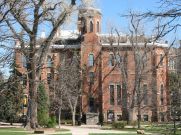NAS has invited readers to submit reflections on older books. This open-ended series of postings aims to show that contemporary books are not the only books that can profit contemporary readers. Guidelines for essay submissions appear here.
Jim Hartley is a Professor of Economics at Mount Holyoke College. This article originally appeared on Professor Hartley's blog.
Native Son is a Great Book.
When I was growing up in California in the late '70s and early '80s, the suburbs were, as far as I could tell, a rather race-neutral place. Then I got to college and was told that by definition, I was a racist. I was force-fed all sorts of books about the “race problem” in America. Those books weren't just history exercises—that America has a troubled history with race is rather obvious—the point was always that America has made no progress in this matter. One would think that abolishing slavery and ending Jim Crow laws would be considered to be progress, but if you said such things, you were obviously unenlightened and (of course) a racist. On every college campus, all sorts of ethnic enclaves were being set up; not just in dormitories and student groups, but in the curriculum as well. If you said that setting up ethnic enclaves was moving in the opposite direction of removing race as a category of distinction, then you were obviously unenlightened and (of course) a racist. The curriculum was balkanized; black authors were assigned because the authors were black, not because they had anything of universal importance to say. It was a bizarre world in which to come of age.
One byproduct of that education was that it has taken some time for me to get around to reading Richard Wright. You see, I was told he was one of those black authors, the sort of author you would read in a class devoted to authors who were black, but not the sort of author you would read in a class devoted to universal philosophical matters. This is the tragedy of the ethnic enclaves. It is also the tragedy of modern literary studies in college. You read books not to wrestle with timeless universal concerns, but to validate your preexisting political beliefs. Native Son, published in 1940, is taught in classes where the point is to show how racist American society still is in the 21st century.
Every now and then, I had heard that Wright was a fantastic writer. But not often enough; most of the time I heard about him it was in the context of “protest novel” and “communism.” But, I finally got around to reading Native Son. Wow. Great book, and as noted above, most probably, Great Book. But, its greatness has nothing to do with being a means of implicating America in being racist.
The story: Bigger, a young black thug, gets a job as a chauffeur to wealthy white family, murders the daughter on his first night on the job, does a terrible job trying to cover up the crime, is discovered, flees, murders another girl, is caught, and is put on trial. The book highlights two great divides in American society.
First, the Black-White divide. As a historical matter, Wright’s book is enormously influential in highlighting this divide. No doubt about it: in 1940, three quarters of a century after the Civil War, the divide between Blacks and Whites was large and in desperate need of being corrected. Wright does a fantastic job illustrating the divide and the effects of the divide. On this level, Wright’s book is an amazing piece of American history. But, on this level, it is comparable to Uncle Tom’s Cabin, an enormously important and influential novel that is terribly dated and not really all that engrossing.
The second divide, and it is well worth noting that it is not obvious whether the first or second divide is the more significant one in the novel, is the difference between the wealthy and the poor. Communists loom large in this book. In other words, the explanation for the actions of Bigger are overdetermined—does he act the way he acts because he is black in a society which relegates blacks to being second-class citizens or because he is poor in a society which relegates the poor to being second class citizens? Presumably, some teacher somewhere, desperate to find an essay topic in which students could analyze or review Native Son, has assigned that question.
But, and here is where the novel reaches Greatness, there is a third possibility. Imagine for a second that Bigger is a person. Not a black person. Not a poor person. Just a person. Everyone around Bigger wants to label him. They want to tell him he is black or poor. (Just like everyone reading the novel wants to label him as black or poor.) So, Bigger grows up learning to act like he is just a walking label. But, imagine the sudden realization that Bigger has sitting in his jail cell that he is not just a label. He is a complete and full person. Imagine the shock. He has a hard time wrapping his mind around it all. But, he begins to see the possibilities:
Another impulse rose in him, born of desperate need, and his mind clothed it in an image of a strong blinding sun sending hot rays down and he was standing in the midst of a vast crowd of men, white men and black men and all men, and the sun's rays melted away the many differences, the colors, the clothes, and drew what was common and good upward toward the sun…
I have this funny dream where one day people will read Native Son and notice that Bigger is not a poor, black man, but that he is a man and they will treat him like a man and ask him what he feels not as a part of a larger class, but what he feels himself. I have this funny dream that one day we will all talk to each other like that, that we will all treat each other like individuals unique and three-dimensional. I have this funny dream that one day the idea of assigning Richard Wright in an “African-American Literature” course will seem insulting and old-fashioned because Richard Wright is not an African-American author, but he is an author, a man who wrote a Great Book.
I don’t know what message Richard Wright thought his book was trying to convey. It doesn’t really matter what he meant to convey. This book is a beautiful testament to the problems inherent in thinking of people only as a member of a class of people. Bigger deserves more. He deserves to be seen as an individual, not as a member of a class. It is a tragedy, a true tragedy, that a quarter of a century after Native Son, Bigger is still not accorded his full measure of humanity.
Image: Wikimedia Commons, Public Domain













